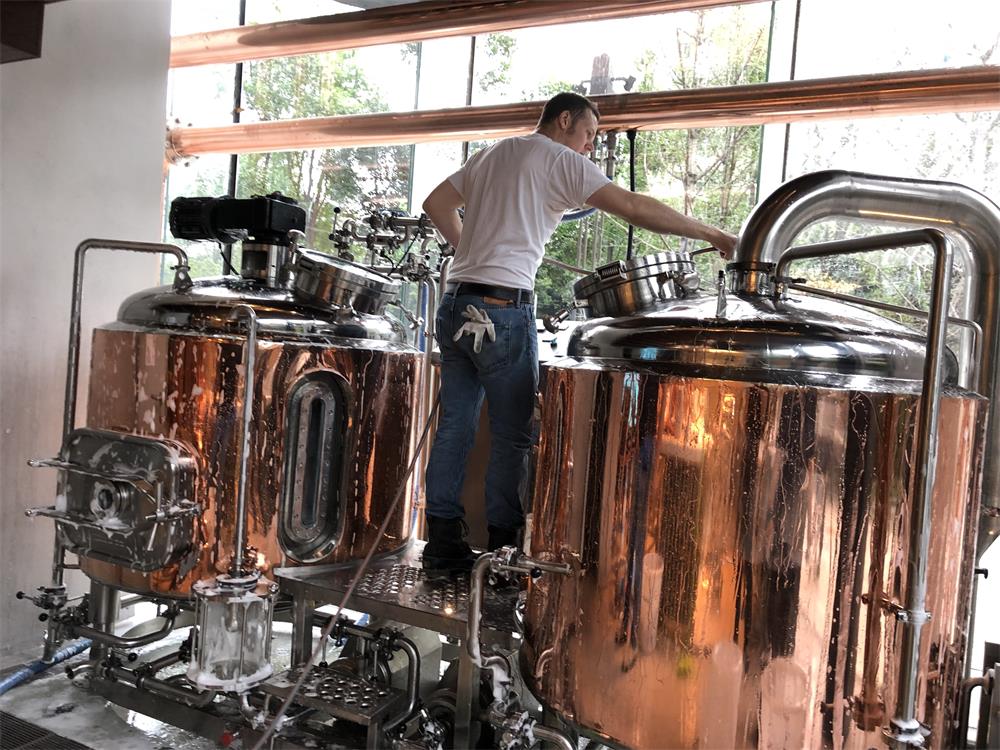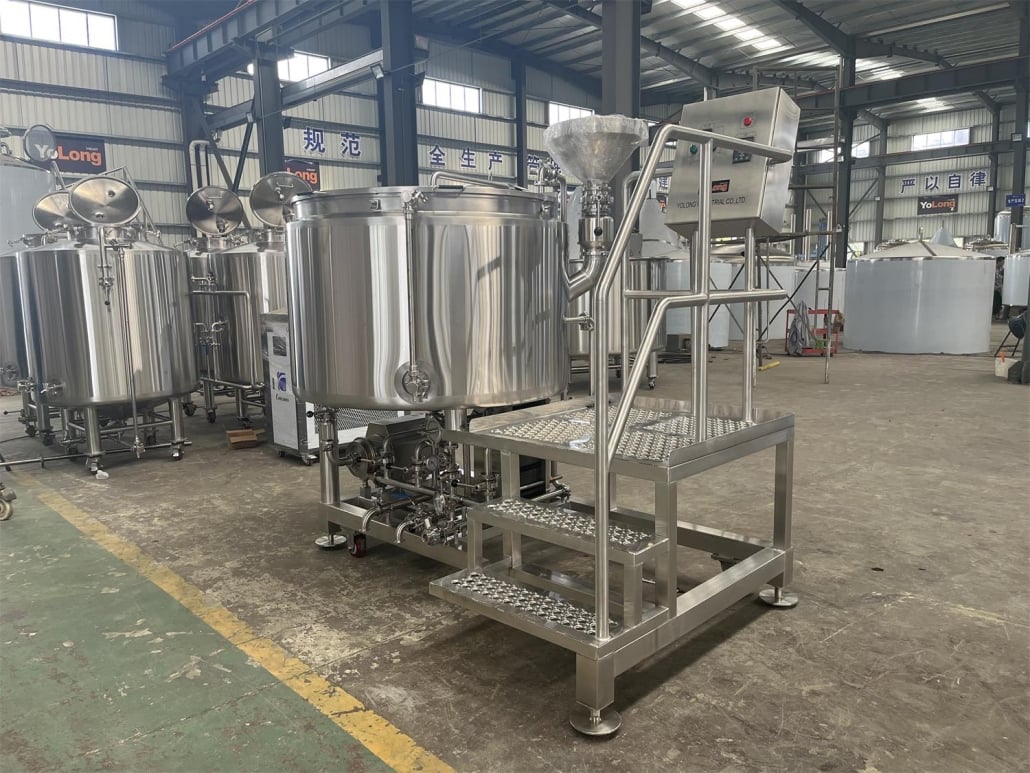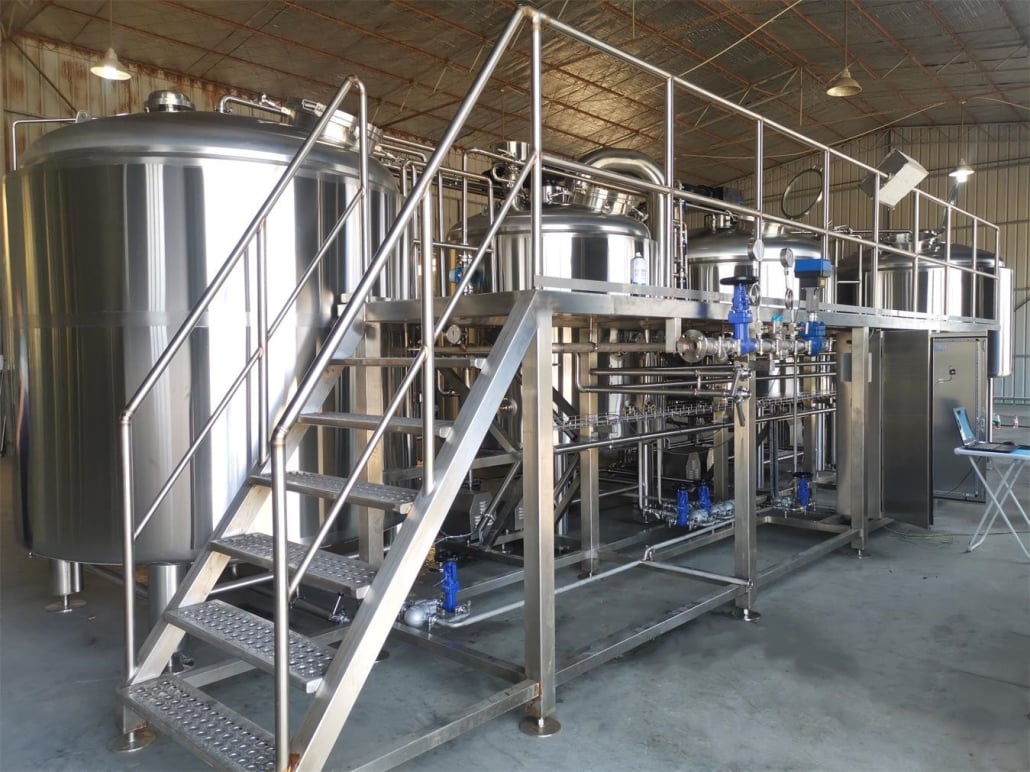7 Key Factors to Consider When Buying Fermentation Tanks for Sale
Introduction
Fermentation tanks play a crucial role in various industries, particularly in brewing and winemaking. These specialized vessels provide an ideal environment for fermentation to occur, allowing the transformation of raw ingredients into flavorful beverages. Whether you’re a commercial brewer or a passionate home winemaker, having the right fermentation tanks is essential to ensure the quality and consistency of your final product. In this article, we will explore the world of fermentation tanks, their types, factors to consider when buying, popular manufacturers, and where to find fermentation tanks for sale.

Understanding Fermentation Tanks
What are Fermentation Tanks?
Fermentation tanks, also known as fermenters, are containers designed to facilitate the fermentation process in industries such as brewing, winemaking, and even biofuel production. These tanks provide an ideal environment for the controlled fermentation of raw ingredients, such as malted grains, grapes, or other fruits, by providing the necessary conditions for yeast or bacteria to convert sugars into alcohol, carbon dioxide, and other desired byproducts.
Importance of Fermentation Tanks in Brewing and Winemaking
Fermentation tanks are vital for ensuring the success and consistency of brewing and winemaking processes. They allow brewers and winemakers to precisely control factors such as temperature, oxygen exposure, and fermentation duration, which greatly influence the flavor, aroma, and quality of the final product. Additionally, fermentation tanks provide a hygienic and controlled environment that minimizes the risk of contamination, ensuring the production of safe and flavorful beverages.
Different Types of Fermentation Tanks
There are various types of fermentation tanks available in the market, each suited for specific purposes and production scales. Some common types include:
- Cylindrical Conical Tanks (CCTs): These tanks are widely used in commercial breweries and wineries. They have a cylindrical shape with a cone at the bottom, allowing for easy collection of yeast and sediment during the fermentation process.
- Open-Top Fermenters: Typically used in winemaking, these tanks have an open top that allows for better maceration and extraction of flavors from grape skins.
- Closed-Top Fermenters: Often employed in large-scale brewing operations, these tanks are sealed to prevent oxygen exposure, resulting in cleaner fermentation and reduced risk of off-flavors.
- Stainless Steel Tanks: Known for their durability, cleanliness, and temperature control capabilities, stainless steel tanks are popular in both commercial and homebrewing settings.
- Oak Barrel Fermenters: These traditional vessels add unique flavors and characteristics to wines and certain beers during fermentation. Oak barrels are commonly used for aging and imparting distinct wood-derived flavors.

Factors to Consider When Buying Fermentation Tanks
When purchasing fermentation tanks, several factors need to be taken into account to ensure the tanks meet your specific requirements. Consider the following:
Size and Capacity
The size and capacity of fermentation tanks depend on the scale of production and available space. Assess your brewing or winemaking needs and choose tanks that provide sufficient volume for the intended batch sizes.
Material and Construction
Select tanks made from high-quality materials suitable for the beverage you are producing. Stainless steel tanks are popular due to their durability, ease of cleaning, and temperature control properties. Other materials, such as food-grade plastic or oak, may be suitable for specific applications.
Cooling and Insulation
If precise temperature control is essential for your fermentation process, consider tanks with built-in cooling systems or insulation. Temperature stability is crucial to ensure consistent fermentation and the development of desired flavors.
Accessibility and Cleaning
Easy access to the tank’s interior is vital for cleaning and maintenance. Look for tanks with wide openings, removable parts, and efficient cleaning mechanisms to minimize the risk of contamination and simplify the cleaning process.
Cost and Budget
Set a budget and compare prices from different manufacturers and suppliers. While cost is a significant factor, prioritize quality, durability, and suitability for your specific needs when making a purchase decision.
Where to Find Fermentation Tanks for Sale
If you’re looking to purchase fermentation tanks, several sources offer a wide selection of options. Consider the following:
Online Marketplaces
Online marketplaces, such as specialized brewing or winemaking equipment websites, provide a convenient platform to explore and compare different fermentation tank models and prices. You can browse a variety of options and often read reviews from other buyers.
Equipment Suppliers and Retailers
Local or online equipment suppliers and retailers that cater to brewing, winemaking, or food processing industries usually stock fermentation tanks. Visit their stores or browse their websites to find suitable tanks for sale.
Local Classifieds and Auctions
Occasionally, you may find fermentation tanks for sale through local classified advertisements or auctions. These platforms can offer cost-effective options, particularly if you’re open to purchasing used or surplus tanks.

Tips for Buying Used Fermentation Tanks
If you’re considering buying used fermentation tanks, here are a few tips to ensure a successful purchase:
Inspecting the Tanks
Thoroughly inspect the tanks for any signs of damage, rust, or leaks. Pay close attention to welds, valves, and fittings. If possible, request a demonstration of the tanks’ functionality before finalizing the purchase.
Verifying Condition and Maintenance
Inquire about the tanks’ history, including previous usage and maintenance records. Ensure that the tanks have been well-maintained and are in good working condition. Ask about any repairs or modifications made to the tanks.
Negotiating the Price
When buying used tanks, it’s common to negotiate the price. Research the average market value of similar tanks and use that information to negotiate a fair price with the seller. Be prepared to compromise while keeping your budget and requirements in mind.

Conclusion
Fermentation tanks are essential equipment for brewers and winemakers, providing the ideal environment for controlled fermentation and ensuring the quality and consistency of the final product. When purchasing fermentation tanks, consider factors such as size, material, cooling capabilities, accessibility, and cost. Reputable manufacturers offer a range of options to suit different needs, and you can find fermentation tanks for sale through online marketplaces, equipment suppliers, and local classifieds. If buying used tanks, inspect them carefully, verify their condition and maintenance history, and negotiate the price to ensure a successful purchase.
By investing in the right fermentation tanks, you can enhance your brewing or winemaking process and produce exceptional beverages that delight your customers or guests.
FAQs
Can fermentation tanks be used for other purposes besides brewing and winemaking?
While fermentation tanks are primarily used in brewing and winemaking, they can also be utilized in other industries that involve fermentation processes, such as biofuel production or the creation of fermented food and beverages.
How long do fermentation tanks last?
The lifespan of fermentation tanks depends on various factors, including the quality of materials, maintenance practices, and frequency of use. Well-maintained tanks can last for many years, even decades.
Can fermentation tanks be customized to meet specific requirements?
Yes, many manufacturers offer customization options to tailor fermentation tanks to specific requirements. This may include modifications to the size, fittings, or additional features to enhance functionality.
Are fermentation tanks easy to clean?
Fermentation tanks designed with accessibility and cleaning in mind can be relatively easy to clean. Tanks with wide openings, removable parts, and efficient cleaning mechanisms simplify the cleaning process and help maintain hygiene standards.
What is the average price range for fermentation tanks?
The price range for fermentation tanks can vary significantly depending on factors such as size, material, features, and the manufacturer. Generally, prices can range from a few hundred to several thousand dollars per tank, with larger or specialized tanks being more expensive.
Additional FAQs for Buying Fermentation Tanks
- Q: What pressure rating should I look for when buying fermentation tanks?
A: For beer, pressure-capable unitanks rated 2.0–3.0 bar support spunding and in-tank carbonation. Non-pressurized FVs (≤0.2 bar) are sufficient for many wines/ciders but limit process flexibility. - Q: Which interior surface finish (Ra) improves hygiene and cleanability?
A: Specify Ra ≤0.6 μm for commercial brewing/winemaking; some QA-driven producers choose Ra ≤0.4 μm to reduce biofilm risk and CIP time. - Q: How do I size glycol chilling for new tanks?
A: A quick plan is 1.25–1.5 kW of chilling per actively fermenting 10 hL vessel (ales). Validate worst-case loads for simultaneous crash cooling and warm ambient conditions. - Q: Are horizontal tanks better than vertical conicals for lagers?
A: Horizontal lagering tanks shorten clarification time and enhance yeast settling due to low hydrostatic pressure. Vertical conicals (CCTs) are more versatile and space-efficient; many breweries use both. - Q: What documentation should accompany fermentation tanks for compliance?
A: Request PED/ASME certification (as applicable), PRV set/test records, hydrostatic/pressure test reports, materials traceability (304/316L), weld maps, passivation certificates, and electrical/controls conformity (UL/CE).
2025 Industry Trends for Buying Fermentation Tanks
- Pressure-capable unitanks as standard: even small breweries favor 2–3 bar designs for spunding and closed transfers.
- Oxygen control emphasis: DO targets <0.1–0.5 ppm post‑knockout and <50–100 ppb in package; tanks with low‑O2 hardware and purge-friendly ports.
- Efficiency upgrades: thicker insulation, multi‑zone jackets, and validated CIP cut utilities by 10–25%.
- Smart cellars: PLC/IoT logging for temps, pressures, CIP cycles, PRV events; remote alarms to protect batches.
- Material and QA focus: 316L stainless for acidic beverages and caustic regimes; tighter weld QA and surface finish specs are common in RFQs.
2025 Benchmarks and Buying Checklist for Fermentation Tanks
| Metric/Spec | Typical Target (Craft Brewer/Wine) | Why it Matters |
|---|---|---|
| Design pressure (unitank) | 2.0–3.0 bar | Enables spunding, in‑tank carbonation, and closed transfers |
| Internal surface finish | Ra ≤0.6 μm (aim ≤0.4 μm) | Better cleanability, reduced biofilm risk |
| Jacket zoning | 2–4 zones (FV), full sidewall + cone | Faster, even cooling and crash control |
| Crash rate capability | 0.5–1.5°C/h to 0–2°C | Impacts tank turns and clarity |
| PRV certification | Documented set/test per code | Safety and regulatory compliance |
| DO control features | Purgeable ports, closed transfer fittings | Shelf life and flavor stability |
| CIP verification | Spray ball coverage, flow ≥1.5 m/s | Consistent sanitation and QA |
| Typical cost (10–40 hL FV) | $6k–$45k+ depending on options | Budget and feature planning |
Sources: Brewers Association Sustainability and Quality tools; MBAA Technical Quarterly; OEM datasheets and notified body guidance (2024–2025). Validate locally (PED/ASME, electrical codes).
Latest Research Cases
Case Study 1: Upgrading to Pressure-Rated Unitanks Reduced Oxygen and Tank Time (2025)
- Background: A 15 hL brewery using non-pressurized FVs reported higher package DO and slow lager turns.
- Solution: Replaced two FVs with 2.5 bar unitanks; added CO2-purged closed transfers, spunding at 0.8–1.0 bar, and inline DO checks pre‑package.
- Results: Package DO median dropped from 140 ppb to 58 ppb; lager tank time shortened by ~2 days; returns justified premium tank cost within 14 months.
Case Study 2: CIP Validation Cuts Utilities and Improves Hygiene (2024)
- Background: Inconsistent CIP on 30 hL conicals led to occasional off‑aromas and high caustic use.
- Solution: Verified spray ball coverage, standardized 1.5–2.0% caustic at 60–70°C with conductivity/time endpoints, and scheduled periodic acid cycles; implemented ATP swabbing.
- Results: Caustic usage down 22%, water per CIP down 18%, ATP failures near zero over 6 months; no CIP-related batch losses.
Sources: Brewers Association Quality Subcommittee guidance; MBAA TQ case notes on oxygen control and CIP validation; supplier application papers. Outcomes vary with SOP adherence and site conditions.
Expert Opinions
- Mary Pellettieri, Brewing Quality Consultant; Author, “Quality Management for Breweries”
- Viewpoint: “When buying fermentation tanks, prioritize oxygen control features and verifiable cleanability—these directly protect flavor and shelf life.”
- John Mallett, Former VP of Operations, Bell’s Brewery; Author of “Malt”
- Viewpoint: “Specify weld quality, surface finish, jacket zoning, and documented PRV testing before adding optional accessories.”
- Dr. Tom Shellhammer, Professor of Fermentation Science, Oregon State University
- Viewpoint: “Tank geometry and thermal management influence yeast performance and hop expression; consistent thermal profiles are key to predictable outcomes.”
Practical Tools and Resources
- Brewers Association: Quality, Safety, Sustainability, Supplier Directory — https://www.brewersassociation.org/
- Master Brewers Association of the Americas (MBAA) Technical Quarterly — https://www.mbaa.com/
- ASME Boiler & Pressure Vessel Code; EU PED overview — https://www.asme.org/ and https://single-market-economy.ec.europa.eu/
- DO/CO2 instrumentation: Anton Paar (https://www.anton-paar.com/), Haffmans/Pentair (https://foodandbeverage.pentair.com/), Zahm & Nagel (https://zahmnagel.com/)
- Sanitation/CIP chemistry and guides: Five Star Chemicals — https://fivestarchemicals.com/
- Equipment marketplaces for new/used tanks: ProBrewer Classifieds — https://www.probrewer.com/; BrewBids — https://www.brewbids.com/
Last updated: 2025-09-04
Changelog: Added 5 focused FAQs on specifications and compliance; provided a 2025 benchmarks/buying checklist table; included two recent case studies on unitanks and CIP validation; added expert viewpoints; curated practical tools/resources with authoritative links.
Next review date & triggers: 2026-03-01 or earlier if PED/ASME guidance changes, BA/MBAA publish updated cellar benchmarks, or new research impacts oxygen control and CIP best practices for fermentation tanks.
Share this entry
Interested in learning more about Brewing Systems including additional details and pricing information? Please use the form below to contact us!
YOLONG BREWERY EQUIPMENT FAQS
- Commercial Brewery / Craft Brewery / Microbrewery / Nanobrewery
- What is The Difference Between Craft Beer and Industrial Beer?
- The Bespoke Differences In Custom Brewing Systems
- Everything You Need to Know About Kettle Souring
- How to Choose Brewing Equipment for Your business?
- How To Choose The-Best Partner To Build Your Commercial Microbrewing System?
- Two Detection Sensors That You Need To Use In Your Brewhouse System
- Remote Control Applications in Brewing Equipment/How does it work?
- How To Clean Your Brand New Brewery Tanks?

